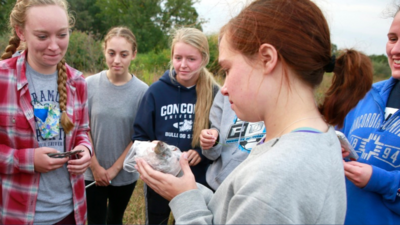What Can You Do with a Major in Environmental Science?

Environmental science is an interdisciplinary field that synthesizes knowledge, practical skills and methods from several areas of study with the aim of understanding and addressing challenges to the local, national and global environments in which we live.
Students who find that they care deeply about nature and love the natural world or are passionate about protecting Earth’s resources for future generations may find an environmental science degree to be a great fit for them and their skills. The most unique aspect of a degree in environmental science, however, is the interdisciplinary nature that can appeal to students with skills in the natural sciences, communication, writing, advocacy and more. At Concordia Nebraska, environmental science students will have the opportunity to take classes in areas such as geography, biology, business and others.
Environmental science offers a range of careers wide enough to accommodate students who hold a bachelor’s degree and those who wish to pursue a graduate education. According to Forbes, environmental science majors who hold a bachelor’s degree are eligible to work in fields such as geoscience, zoology, conservation and others! Conservation scientists, for example, earn around $64,000 annually and can work for the government or in the private sector. The National Park Service is one frequent employer of environmental science and related majors – this means that you could work in a state or national park!
The field of environmental research is always changing and expanding. For students who wish to pursue graduate education in environmental science, conducting research in a particular specialty is an option that can open even more career paths. According to the U.S. News and World Report, not all environmental science careers mean that you’ll be hiking all day – many environmental scientists work in offices or laboratories. Specialties in aquatic biology, environmental policy, alternative energy or environmental agriculture, to name a few possibilities, can make students competitive for positions in academia, field or lab research, or advocacy.
One such career route, advocacy, is one that may appeal to students who love nature and are skilled communicators. Students who major in environmental science or environmental studies can go on to become lobbyists, or, with a law degree, environmental lawyers. These unique careers combine environmental science with political science and allow students to ensure that corporations cooperate with policies, interpret laws regarding environmental issues, or persuade politicians to vote with the environment in mind.
Overall, environmental science is a very broad, interdisciplinary degree – so it’s important for students to identify interests within the field that can help them to narrow their career choices and focus on their unique passions. At Concordia, environmental science majors can choose an emphasis from among the topics of biology and natural resources, business, chemistry or geography. Choosing an emphasis, additional minor, or even a double major in a related field can increase students’ competitiveness for graduate school admissions or future jobs.
Of course, the broad scope of the field of environmental science is also one of its greatest benefits. Students can synthesize their love for nature and concern for the environment with nearly any other skill or passion they possess. Work environments, schedules and locations are highly variable, as are the topics available for study. Salaries are nothing to worry about, either – bachelor's level jobs, such as those in forestry, average over $60,000 annually, while more specialized jobs in geoscience, hydrology or environmental engineering can earn upwards of $100,000!
Whether you are the “outdoorsy” type or prefer a more solitary, lab-based job, if you love the environment and care about its wellbeing, environmental science could be the major for you! Choosing to study this broad discipline at a school like Concordia will set you up for future success in the field and launch you into a rewarding career!
Interested in Concordia’s environmental science program? Learn more here.
Related Stories


